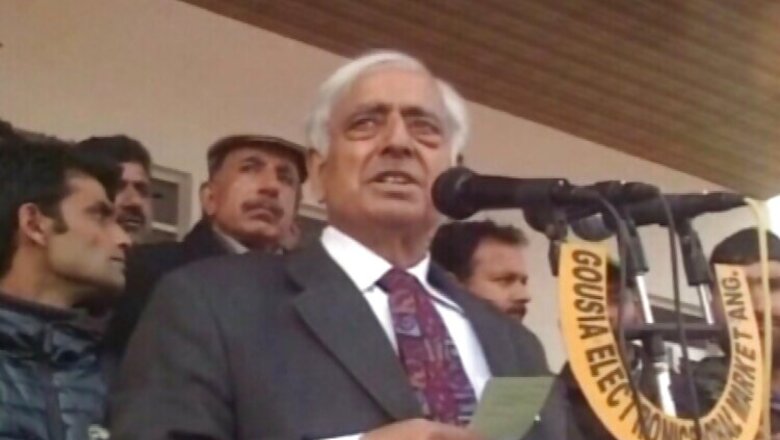
views
Srinagar: The Jammu and Kashmir High Court has directed the state government to hoist the state flag on official buildings and vehicles of constitutional authorities in adherence to the mandate and spirit of J&K Prevention of Insult to State Honour Act, 1979.
The court restored the government circular no. 13-GAD of March 12, 2015 enjoining upon all constitutional authorities to hoist the state flag atop their official buildings and
vehicles.
Justice Hasnain Masoodi, in an order passed last week, also set aside the circular no. 14-GAD of March 13, 2015 which had rescinded the earlier circular.
"The court makes it clear that respondents by issuing Circular No.13-GAD of 2015 dated 12th March 2015, enjoining upon all constitutional authorities and thereafter withdrawing it by a one line circular, have in effect conveyed the message that constitutional authorities may not adhere to whatever was required in terms of Circular No.13-GAD of 2015 dated 12th March 2015.
"Circular No. 14-GAD of 2015 dated 13th March 2015 does not give any reason for withdrawal of earlier circular," the court said.
"The respondents and all constitutional authorities shall adhere to and abide by mandate and spirit of Section 144, Constitution of Jammu and Kashmir, J&K Prevention of Insult to State Honour Act, 1979 and Circular No. 13-GAD of 2015 dated 12th March 2015," it said.
The court said such adherence obviously is to include hoisting of the state flag on the buildings housing offices of constitutional authorities and on vehicles used by such
authorities.
Justice Masoodi, elaborating with the reference of a Supreme Court judgement, said that flag is symbol of struggle to achieve goals of freedom movement as also of values that form edifice of polity proposed to be created. "It connects past with present and future. Flag while reminding us of struggle made by the people and their sacrifices also makes us aware of our aspirations," the judgement reads.
Underscoring the importance of the state flag, the court said that Jammu and Kashmir is only state in the Union that has its own flag adopted by its Constituent Assembly, and
provided in its Constitution.
"The state flag is one of the attributes of constitutional autonomy or limited or residual sovereignty by whatever name we call it, enjoyed by the State of Jammu and Kashmir. "The present discussion on plea raised is therefore, embedded in discourse on extent and scope of the autonomy or limited sovereignty available to the state," the court said.
The sentiments expressed in the Constituent Assembly of India were echoed in the Constituent Assembly of Jammu and Kashmir by the leader of House (Prime Minister) on June 7, 1952 while moving resolution for adoption of the flag of Jammu and Kashmir State, the HC observed.
It said the mover of resolution and participants in the debate highlighted features of the flag and sentiments these represented.
Three parallel strips on the flag were said to represent three regions of the state, its colour to reflect ideals of secularism and the plough to respect for peasants and workers, it said.
The court observed that the state in its objections to the writ petition did not dispute that constitutional authorities are to maintain sanctity of the state flag and respect the state flag in terms of the constitutional provisions and the Jammu and Kashmir Prevention of Insult to State Honour Act, 1979.
It was, however, contended by the respondent state before the court that the mandate or duty is clear and explicit in Section 144 of the state Constitution, and all concerned were not to be reminded of their duty to respect the state flag.
They justify withdrawal of Circular No.13-GAD of 2015 dated 12th March 2015 on said ground alone, it said, noting that the justification sought to be offered is far from
convincing. The respondents were to realise that once it was found necessary to enjoin upon all constitutional authorities to respect the state flag in the manner set out in circular No. 13-GAD of 2015 dated 12th December 2015, reminding them that they by not respecting the flag in the manner indicated in the circular, may attract penal consequences under J&K Prevention of Insult to State Honours Act, 1979, it was not open to the respondents to withdraw circular by one line order without indicating reasons for such withdrawal, the court said.
It is a matter of common sense that once a person in terms of a written circular is required to act in a particular manner as acting in the manner directed would be necessary to carry out mandate of law, the net effect of withdrawing such circular would be declaring that the person need not act in the manner he was required to act in obedience to the Constitution and law, it added.



















Comments
0 comment